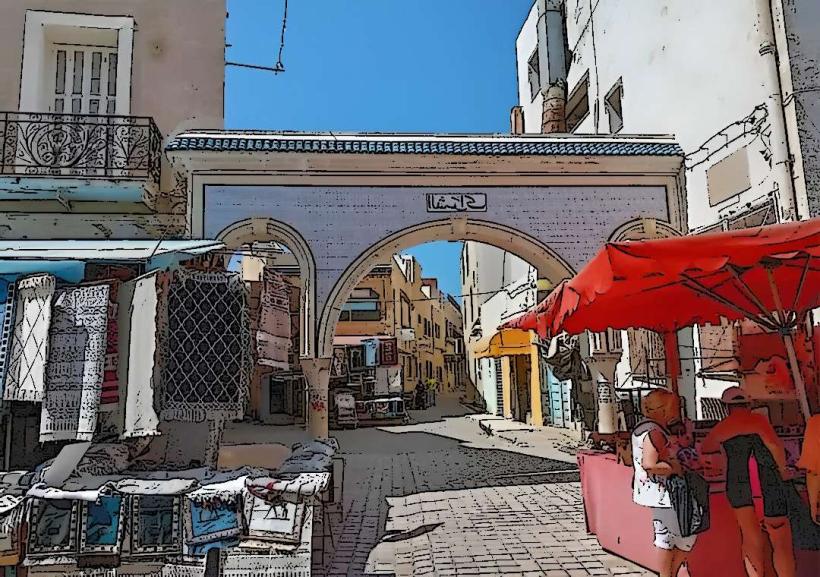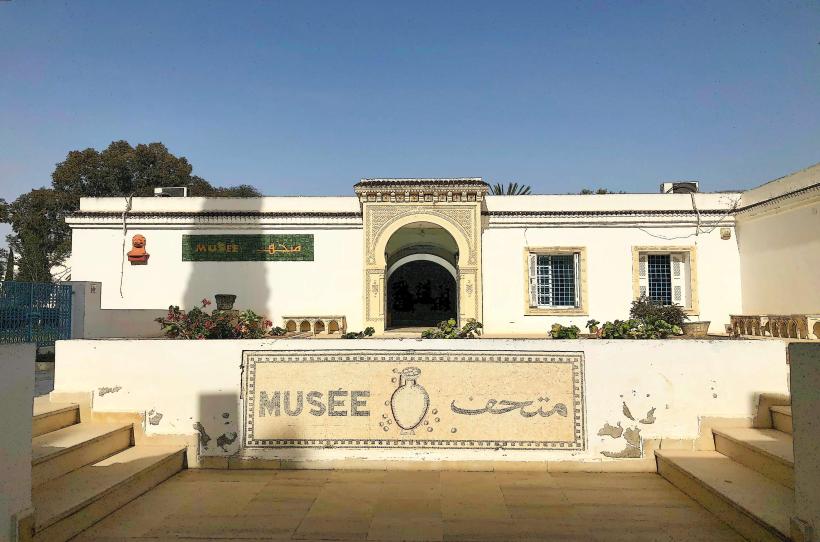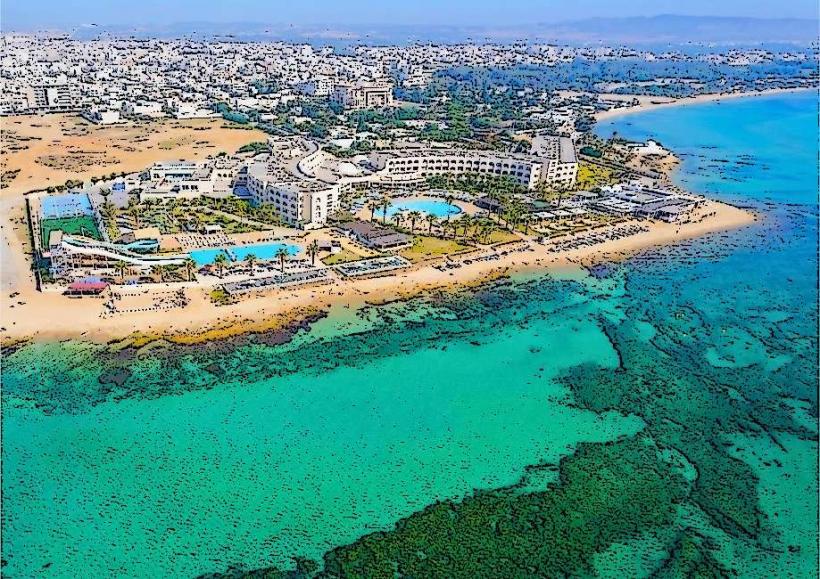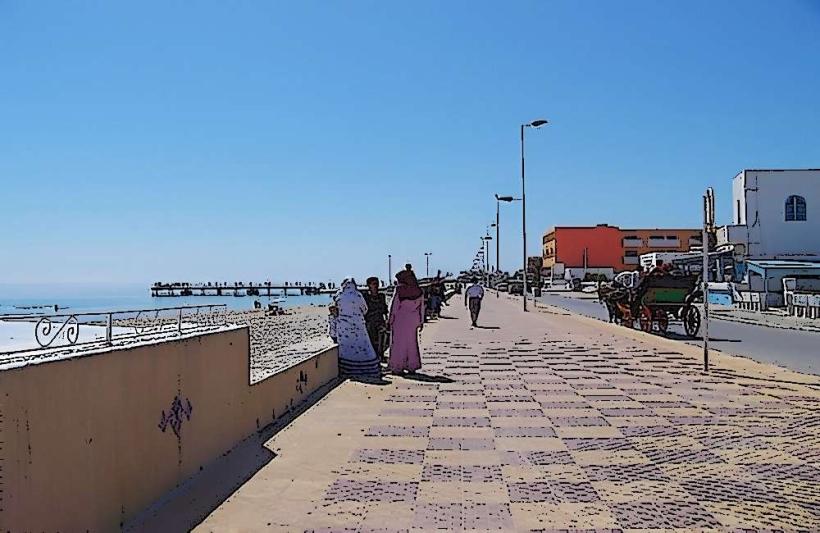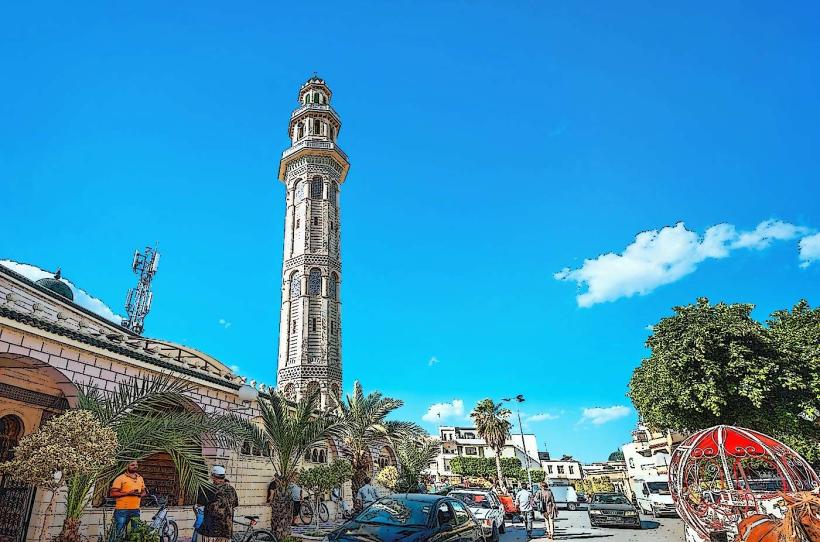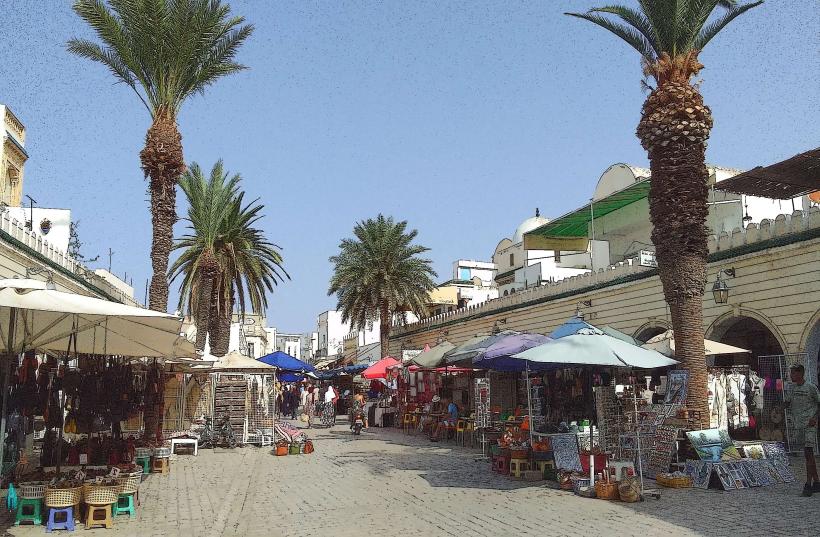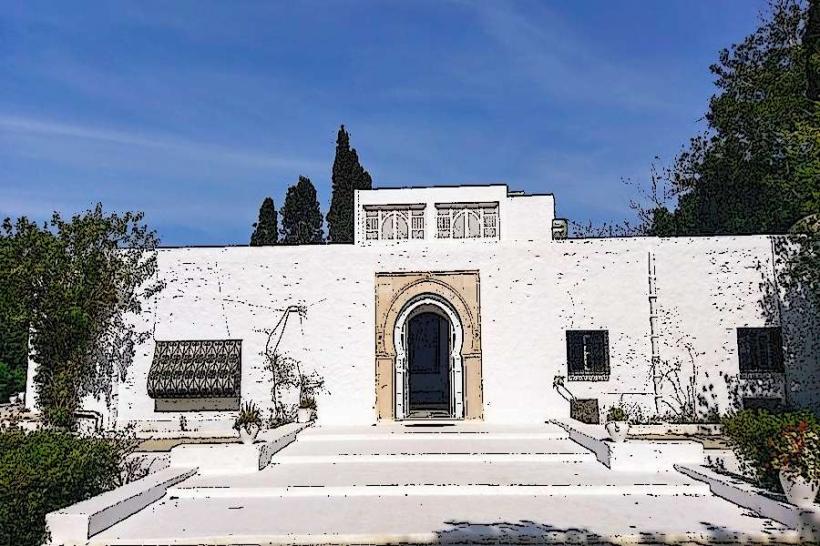Information
City: NabeulCountry: Tunisia
Continent: Africa
Nabeul, Tunisia, Africa
Nabeul is a vibrant coastal city in northeastern Tunisia, located on the Cap Bon Peninsula, facing the Mediterranean Sea. It is the capital of the Nabeul Governorate and one of Tunisia's key cities known for its rich historical heritage, agriculture, handicrafts, and tourism. Nabeul is often referred to as the ceramics capital of Tunisia, owing to its centuries-old tradition of pottery and tile-making. The city is also a prominent seaside resort, offering a combination of cultural attractions, beautiful beaches, and agricultural production.
Geographic and Environmental Context
Location: Nabeul lies about 60 km southeast of Tunis, the capital of Tunisia, and is situated on the Mediterranean coast. The city is located at the northern tip of the Cap Bon Peninsula, which is known for its fertile lands and attractive coastline.
Climate: Nabeul enjoys a Mediterranean climate with mild, rainy winters and hot, dry summers. The sea breeze helps moderate temperatures, making it a popular destination for beachgoers.
Surroundings: The region around Nabeul is characterized by olive groves, citrus orchards, and vineyards, all of which benefit from the fertile soils of the peninsula.
Historical and Cultural Overview
Ancient History: Nabeul was known as Neapolis during the Roman period, and the city has a history that stretches back to ancient times. It was an important hub for trade, especially in the Roman Empire. The ruins of the ancient Roman city can still be seen in the area, providing insights into its historical significance.
Islamic and Ottoman Eras: Like many other Tunisian cities, Nabeul thrived during the Islamic period, when its port became an important center for trade and culture.
Modern Development: Today, Nabeul is a bustling city that blends its rich historical roots with modern development, particularly in tourism, agriculture, and handicrafts.
Economy
Agriculture: Nabeul's fertile lands are known for the production of citrus fruits, particularly oranges and lemons, as well as olives and grapes. The region is one of Tunisia’s key agricultural producers, and the citrus orchards around Nabeul contribute significantly to the country’s export economy.
Handicrafts: Nabeul is renowned for its ceramics, including brightly colored pottery, tiles, and jars. The Medina (old town) is full of workshops where artisans continue to produce traditional pottery. The city is also famous for embroidery, textiles, and woven products.
Tourism: The city's proximity to beautiful beaches, combined with its rich history and handicraft traditions, makes Nabeul a key destination for tourists, especially in the summer months. The presence of resorts, cultural events, and beaches ensures that tourism is a major part of the local economy.
Fishing and Commerce: As a coastal city, fishing also plays a role in the local economy, and Nabeul has a small port for maritime trade.
Architecture and Urban Layout
Old Town (Medina): Nabeul’s Medina is a charming area with narrow streets, traditional houses, and a strong focus on handicrafts. The souks (markets) in the Medina sell pottery, textiles, spices, and other local goods. The city’s Mosque of Nabeul, with its distinct architecture, is a key landmark in the heart of the Medina.
Roman Ruins: The ruins of Neapolis, the Roman predecessor of Nabeul, are still visible in the area. Roman baths, mosaics, and other ancient structures can be explored, giving a glimpse into the city's past.
Modern Development: While Nabeul maintains much of its historical charm, the city has modern amenities such as shopping malls, restaurants, and resorts. The development around the seafront area is focused on tourism, with several hotels and beachfront resorts catering to visitors.
Ceramic Workshops: Nabeul is famous for its ceramic workshops, where artisans handcraft pottery, tiles, and decorative items using traditional methods. These workshops are scattered throughout the city, and visitors can watch artisans at work or purchase locally made items.
Society and Lifestyle
Population: Nabeul is a medium-sized city with a population that includes both urban residents and people from surrounding agricultural areas. The local population is primarily Arab-Berber.
Language: The majority of the population speaks Tunisian Arabic (Derja), though Modern Standard Arabic is used for formal communication and French is commonly spoken, especially in business and education.
Religion: The population is predominantly Muslim, with a number of mosques throughout the city. Islamic traditions and practices play a central role in daily life.
Culture and Traditions: Nabeul has a strong cultural identity, shaped by its historical roots and proximity to the Mediterranean. The city is known for its traditional music, dance, and festivals, with events such as the Festival of Nabeul showcasing local art and culture.
Food and Cuisine
Citrus Fruits: Given its role as a key citrus-producing region, oranges, lemons, and grapefruits are a staple of Nabeul’s cuisine. They are used in juices, salads, and as a flavoring in various dishes.
Seafood: As a coastal city, Nabeul offers fresh fish, octopus, and shellfish. Common dishes include grilled fish, seafood couscous, and fish tagine.
Traditional Dishes: Popular Tunisian dishes such as brik (fried pastry stuffed with egg and tuna), couscous, tajine, and mechoui (roasted lamb) are commonly enjoyed in Nabeul.
Pastries: Baklava, Makroud (semolina cake filled with dates), and other sweet pastries are often served during holidays and celebrations.
Infrastructure and Development
Transportation: Nabeul is well-connected to Tunis and other cities in Tunisia via a good network of roads. Public transportation is available, and louages (shared taxis) are common for intercity travel. Nabeul is also served by a small local airport that connects to other regions in Tunisia, and the nearby Hammamet International Airport provides additional connections for tourists.
Healthcare: The city has a regional hospital and several medical clinics offering both public and private healthcare services.
Education: Nabeul has several primary and secondary schools, as well as a university, which offers courses in arts, science, and business.
Surroundings and Nearby Attractions
Hammamet: Located nearby, Hammamet is one of Tunisia’s most famous resort towns, known for its beaches, luxury hotels, and historical sites.
Yasmine Hammamet: A modern resort area located a few kilometers from Nabeul, with luxury hotels, beaches, and a marina.
The Roman Site of Pupput: Near Nabeul, this archaeological site features the ruins of a Roman city, with mosaics, baths, and ancient structures.
Beaches: Nabeul’s coastline is lined with beautiful sandy beaches, ideal for swimming, sunbathing, and water sports.
Identity and Atmosphere
Mediterranean Charm: Nabeul offers a blend of Mediterranean culture, North African traditions, and Islamic heritage, creating a city with a relaxed and welcoming atmosphere.
Crafts and Art: The city’s identity is closely tied to its centuries-old tradition of ceramics, making it a must-visit for those interested in traditional handicrafts.
Tourism-Friendly: While Nabeul has modern facilities, it retains its authentic charm, with markets, traditional workshops, and local festivals that highlight its cultural heritage.
Conclusion
Nabeul is a city where the Mediterranean beauty, Tunisia’s agricultural wealth, and rich craftsmanship converge, offering visitors a unique experience. Whether you’re exploring the Roman ruins, shopping for handcrafted pottery, or relaxing by the beach, Nabeul provides a perfect blend of tradition and modernity.

